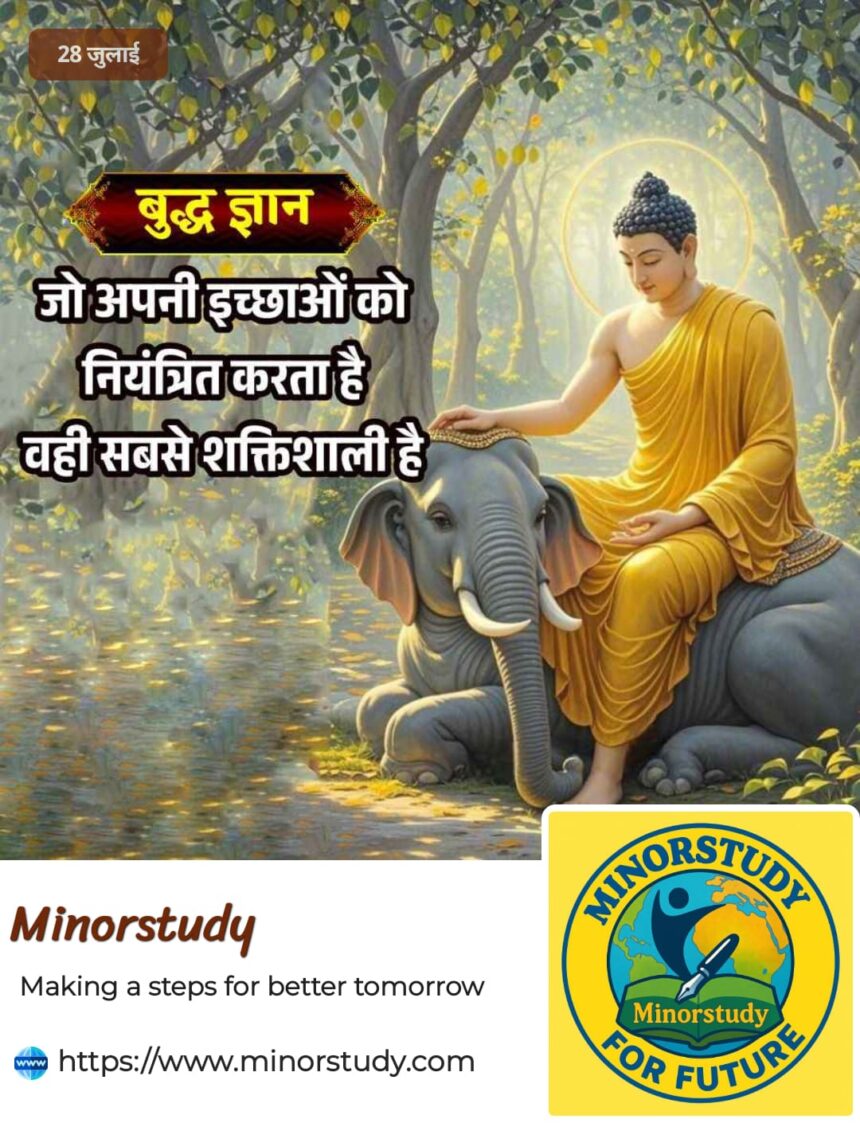🧘♂️ 7 Profound Truths Why Controlling Desires Makes You Incredibly Powerful – Lord Buddha Eye-Opening Lesson
“The one who controls his desires is the most powerful.”
— Lord Buddha
In a world where materialism, greed, and constant craving dominate the human psyche, this simple yet transformative truth from Lord Buddha offers the ultimate roadmap to freedom, peace, and real inner strength.
- 🧘♂️ Who Was Lord Buddha?
- 📜 History Behind the Quote
- 🗓️ Timeline Snapshot of Key Events
- 📌 Key Teachings Related to Desire
- 🎯 7 Powerful Reasons to Control Desires
- 1. 💡 Mental Clarity
- 2. 🌿 Emotional Stability
- 3. 🧘♀️ Inner Freedom
- 4. 🛡️ Resistance to Manipulation
- 5. 🏆 Real Success
- 6. 🌸 Spiritual Growth
- 7. ⚖️ Balanced Life
- 📖 Frequently Asked Questions (FAQs)
- Q1. Why does Buddha emphasize controlling desires?
- Q2. How do I start controlling my desires?
- Q3. Is desire always bad?
- Q4. What is Nirvana in Buddhism?
- 🎉 Observance and Modern Practices
- 🌸 Wishing & Spiritual Message
- 📌 Importance in Our Lives Today
- 👥 Societal Relevance
- 🧠 Important Points Summary
- ✅ Conclusion: The Power of Self-Mastery
In this in-depth article, let’s explore the origin, meaning, history, timeline, significance, observances, FAQs, societal value, and daily life impact of this profound Buddhist insight — and why it remains more relevant than ever.
🧘♂️ Who Was Lord Buddha?
Siddhartha Gautama, known globally as Lord Buddha, was:
Born in Lumbini (modern-day Nepal) around 563 BCE
A prince who gave up luxury to seek the truth of suffering and liberation
Achieved enlightenment under the Bodhi tree in Bodh Gaya at age 35
Founder of Buddhism, one of the world’s most peaceful and profound spiritual traditions
His teachings revolved around the Four Noble Truths, Eightfold Path, and conquering the desire that causes suffering.
📜 History Behind the Quote
This quote finds its roots in the core essence of Buddhism:
According to Buddha, the root cause of suffering (dukkha) is craving or desire (tanha).
The only way to overcome suffering is to let go of desire through discipline, mindfulness, and inner control.
Lord Buddha spoke these words during a sermon to his disciples when discussing how true strength lies not in dominance over others, but in mastery over the self.
🗓️ Timeline Snapshot of Key Events
| Year | Event |
|---|---|
| 563 BCE | Birth of Siddhartha Gautama |
| 534 BCE | Renounced royal life in search of truth |
| 528 BCE | Attained enlightenment in Bodh Gaya |
| 528–483 BCE | Spread teachings of detachment, peace, desire control |
| 483 BCE | Entered Parinirvana (passed away) |
| 3rd century BCE | Teachings spread under Emperor Ashoka |
📌 Key Teachings Related to Desire
“Desire is the root of all suffering.” (Second Noble Truth)
“He who conquers himself is greater than he who conquers a thousand men in battle.”
“Peace comes from within. Do not seek it without.”
In essence, Buddha taught that controlling desire leads to inner strength, self-realization, and lasting happiness.
🎯 7 Powerful Reasons to Control Desires
1. 💡 Mental Clarity
Desire clouds judgment. Freeing yourself from endless wanting leads to clearer thoughts and sharper decision-making.
2. 🌿 Emotional Stability
Uncontrolled desires cause anger, jealousy, and fear. Self-control promotes emotional peace and resilience.
3. 🧘♀️ Inner Freedom
True power is when nothing external controls your internal peace. Controlling desires breaks this dependency.
4. 🛡️ Resistance to Manipulation
Advertisers, toxic relationships, or societal pressures thrive on your desires. Master them, and you become unshakable.
5. 🏆 Real Success
Discipline and restraint lead to focus, patience, and long-term success — in career, relationships, and health.
6. 🌸 Spiritual Growth
Desire ties you to the material. Its control leads to liberation (nirvana) — the ultimate goal in Buddhism.
7. ⚖️ Balanced Life
Less craving = less suffering. You begin to appreciate the present moment and live fully.
📖 Frequently Asked Questions (FAQs)
Q1. Why does Buddha emphasize controlling desires?
Because uncontrolled desires lead to suffering, dissatisfaction, and attachment — which are the root causes of human misery.
Q2. How do I start controlling my desires?
Start with:
Mindful meditation
Practicing gratitude
Avoiding unnecessary temptations
Following the Eightfold Path
Q3. Is desire always bad?
Not necessarily. Healthy desires (like love, growth, or compassion) are fine. It’s attachment and craving that become toxic.
Q4. What is Nirvana in Buddhism?
Nirvana is the liberation from the cycle of birth and death (samsara) — the highest state of peace achieved by eliminating desire.
🎉 Observance and Modern Practices
🗓️ Buddhist Events Celebrating Inner Control:
Vesak (Buddha Purnima) – Celebrates Buddha’s birth, enlightenment, and Nirvana
Dhamma Day – Marks the first teaching on the Four Noble Truths
Pavarana Day – End of monastic retreat focusing on reflection and restraint
🏛️ Places of Learning & Practice:
Bodh Gaya, India – Where Buddha attained enlightenment
Sarnath – First sermon on controlling desire
Vipassana centers worldwide – Teach 10-day meditation for desire control
🌸 Wishing & Spiritual Message
🌼 May you find strength in simplicity,
🌿 Peace in letting go,
🌟 And power in mastering your own desires.
May Buddha’s light guide your heart away from craving and toward contentment.
📌 Importance in Our Lives Today
In a hyper-consumerist age with:
Social media dopamine loops
Endless ads and marketing
Emotional emptiness disguised as “more”
Buddha’s message is a sword of clarity cutting through confusion.
👥 Societal Relevance
Youth battling addiction, peer pressure, and comparison
Families suffering due to unrealistic wants
Mental health crises linked to material dissatisfaction
Society needs this wisdom more than ever — not to escape desire, but to transform it into awareness.
🧠 Important Points Summary
Desire is natural, but its control is divine
Self-mastery is the highest power
Buddha’s insight is a psychological truth as much as a spiritual one
Practicing restraint leads to freedom, power, and purpose
✅ Conclusion: The Power of Self-Mastery
True power lies not in ruling nations or gaining fame, but in ruling oneself. Buddha’s timeless wisdom teaches that a man who conquers his desires is unconquerable.
Control doesn’t mean suppression — it means awareness, discipline, and detachment.
As Buddha said:
“Just as a solid rock is not shaken by the storm, even so the wise are not affected by praise or blame.”
Choose to be that rock. Choose inner power. Choose the path of mindfulness.








